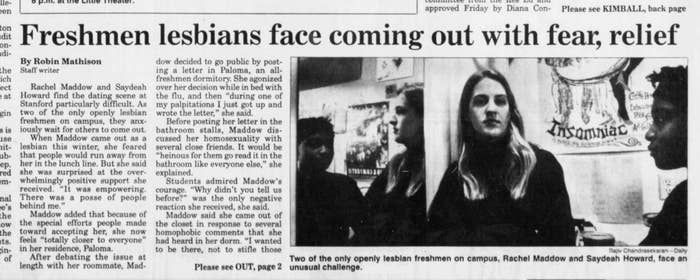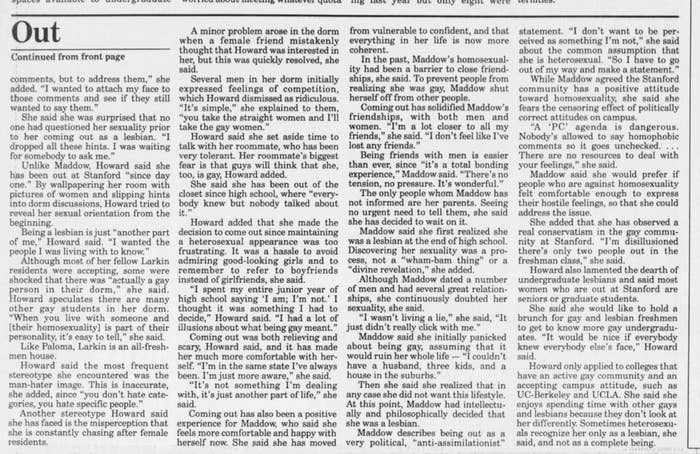
In early 1990s, a young Rachel Maddow was a student at Stanford University who had just figured out that she was gay in a Stanford freshman class that had nearly-zero out students.
"I decided I was going to come out in a very confrontational way," Maddow wrote in a Newsweek article in 2012. "So a friend who was coming out at the same time and I did and interview with the student newspaper about being the only two gay freshman on campus."
Maddow had already publicly come out in her dorm earlier in the winter by posting a public letter in her freshman dorm. The student newspaper, the Stanford Daily wrote the public letter was in response to homophobic comments Maddow had heard.
After debating the issue at length with her roommate, Maddow decided to go public by posting a letter in Paloma, an all freshmen dormitory. She agonized over her decision while in bed with the flu, and then "during one of my palpitations I just got up and wrote the letter," she said. Before posting her letter in the bathroom stalls, Maddow discussed her homosexuality with several close friends. It would be "heinous for them go read it in the bathroom like everyone else," she explained. Students admired Maddow's courage. "Why didn't you tell us before?" was the only negative reaction she received, she said. Maddow said she came out of the closet in response to several homophobic comments that she had heard in her dorm "I wanted to be there, not to stifle those comments, but to address them," she added. "I wanted to attach my face to those comments and see if they still wanted to say them."
The article in the Daily goes on to interview Maddow and Saydeah Howard, "two of the only openly lesbian freshmen on campus," about their decisions to come out. Although Maddow says that she initially "feared that people would run away from her in the lunch line" if she revealed that she was gay, coming out improved her life in a number of ways.
Coming out has also been a positive experience for Maddow, who said she feels more comfortable and happy with herself now. She said she has moved from vulnerable to confident, and that everything in her life is now more coherent. In the past, Maddow's homosexuality had been a barrier to close friendships, she said. To prevent people from realizing she was gay, Maddow shut herself off from other people. Coming out has solidified Maddow's friendships, with both men and women. "I'm a lot closer to all my friends," she said. "I don't feel like I've lost any friends." Being friends with men is easier than ever, since "it's a total bonding experience," Maddow said. "There's no tension, no pressure. It's wonderful."

Maddow describes self-identifying as a lesbian as "a process, not a 'wham-bam thing' or a 'divine revelation,'" and explains that while she had previously had positive romantic relationships with men, "'It just didn't really click with me.'" After overcoming fears that being gay "would ruin her whole life" with the realization that the kind of future her sexuality would preclude was not one that she wanted, Maddow incorporated her lesbianism into her sense of her own identity.
At this point, Maddow had intellectually and philosophically decided that she was a lesbian. Maddow describes being out as a very political, "anti-assimilationist" statement. "I don't want to be perceived as something I'm not," she said about the common assumption that she is heterosexual. "So I have to go out of my way and make a statement."
Maddow expressed pleasure at how accepting the Stanford community had been, but was bothered by the ways that its atmosphere of political correctness prevented an honest dialogue about homosexuality; noting her concern with "the censoring effect of politically correct attitudes on campus ... Maddow said she would prefer if people who are against homosexuality felt comfortable enough to express their hostile feelings, so that she could address the issue."
Although the article's narrative of Maddow's coming out is largely positive, the actual process was complicated by the article itself. The Daily writes that "The only people whom Maddow has not informed are her parents. Seeing no urgent need to tell them, she said she has decided to wait on it."
In a 2012 piece for Newsweek, Maddow wrote about how the article was published before she could tell her "very Catholic" parents:
I told the paper, "I will do this [article] on the condition that you will not run the piece until after this weekend, because I will go home this weekend to tell my parents, and I want them to hear it from me instead of reading it in the paper." And they ran it before the weekend, and indeed some anonymous person helpfully clipped the article and mailed it to my parents—and that's how my parents found out that I was gay.
They would have had a hard time with me coming out anyway, but this was a particularly nasty way for them to find out. They're wonderful now, and couldn't be more supportive, but they took it poorly at first, which I don't fault them for. They were shocked and upset and hurt. First of all, they were having to deal with the fact that I'm gay. Second of all, they were having to deal with the fact that I'm gay in the newspaper. And third of all, they were having to deal with the fact that they've raised some sort of horrific, callous rug rat who would tell the student paper before telling her family.

